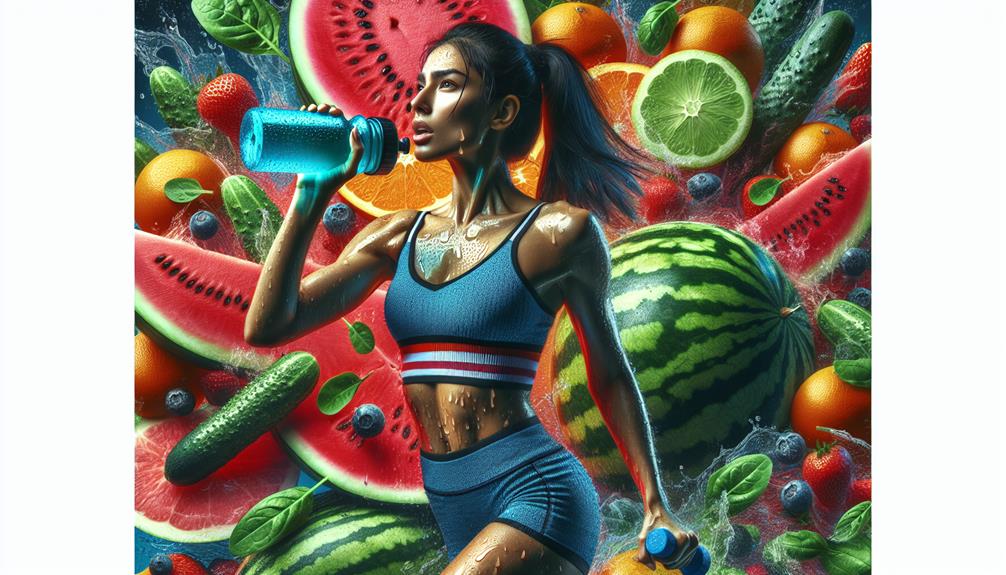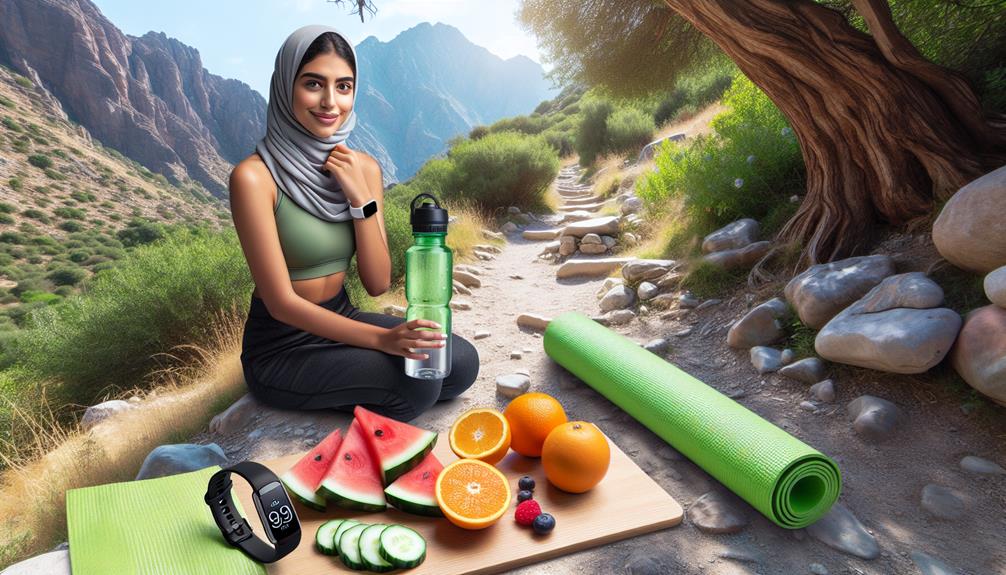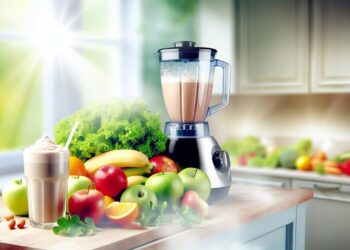Did you know that approximately 60% of the human body is composed of water? Staying adequately hydrated is crucial for your overall health and well-being.
By adopting healthy hydration habits and incorporating simple nutrition tips into your daily routine, you can optimize your water intake and support your body's vital functions.
From the benefits of hydration to practical strategies for monitoring your fluid intake, this discussion will provide you with valuable insights to help you maintain optimal hydration levels.
So, are you ready to discover the secrets to staying well-hydrated and feeling your best?
Key Takeaways
- Proper hydration aids nutrient absorption and toxin removal.
- Monitoring water intake ensures optimal hydration levels.
- Adjust water intake for active lifestyles and exercise performance.
- Consistent hydration habits support overall health and well-being.
Importance of Daily Hydration
To maintain optimal health, it's crucial to prioritize daily hydration by consistently drinking an adequate amount of water throughout the day. Hydration benefits extend beyond quenching thirst; they include regulating body temperature, aiding digestion, transporting nutrients, and supporting overall bodily functions. Water balance is essential for maintaining proper hydration levels, as even mild dehydration can lead to decreased cognitive function, fatigue, and impaired physical performance. Ensuring you consume enough fluids daily helps maintain the delicate balance required for your body to function optimally.
Hydration plays a key role in various physiological processes, including nutrient absorption and waste removal. By staying adequately hydrated, you support your body in efficiently absorbing essential vitamins and minerals from food. Additionally, water helps flush out toxins and waste products through urine, sweat, and bowel movements, promoting overall health. Remember, maintaining proper water balance isn't only about drinking water but also considering factors like physical activity, climate, and individual hydration needs to support your well-being effectively.
Hydration and Nutrient Intake
Hydration, along with a balanced diet, plays a crucial role in ensuring your body efficiently absorbs essential nutrients from the food you consume. Proper hydration helps transport nutrients throughout your body, aids in digestion, and supports overall cellular function.
One common misconception is that staying hydrated means solely drinking water. While water is essential, many other beverages can contribute to your hydration needs, such as herbal teas, milk, and fruit-infused water. These nutrient-rich beverages not only help keep you hydrated but also provide additional vitamins and minerals that can support your overall health.
When it comes to nutrient intake, hydration is key for optimal absorption. Dehydration can hinder your body's ability to absorb nutrients effectively, leading to potential deficiencies. By maintaining adequate hydration levels, you support your body in absorbing essential vitamins and minerals from the foods you eat.
Additionally, staying hydrated can help prevent common issues like constipation, fatigue, and poor concentration that may arise when your body lacks proper hydration. Remember to include a variety of nutrient-rich beverages in your daily hydration routine to support your overall health and well-being.
Practical Hydration Tips

For practical hydration tips that can enhance your daily routine, consider incorporating a variety of beverages to meet your body's fluid needs efficiently. Staying hydrated is crucial for overall health and well-being.
Here are some practical tips to help you maintain optimal water consumption throughout the day:
- Carry a reusable water bottle: Having a water bottle with you makes it easier to sip throughout the day and track your water intake.
- Set hydration reminders: Use your phone or smartwatch to set reminders at regular intervals to drink water.
- Infuse water with fruits or herbs: Adding slices of fruits like lemon or herbs like mint can make water more flavorful and enjoyable.
- Monitor your urine color: Aim for pale yellow urine as an indicator of adequate hydration.
- Choose water-rich foods: Incorporate foods with high water content such as cucumbers, watermelon, and soups into your meals to increase overall water consumption.
Hydration Monitoring Strategies
Consider utilizing a hydration tracking app to monitor your daily water intake accurately and efficiently. Hydration tracking can help you maintain optimal water balance throughout the day, ensuring that you meet your body's fluid needs. Tracking your hydration can be especially beneficial if you have a busy schedule or find it challenging to remember to drink water regularly.
Here is a simple example of how you can track your water intake using a hydration tracking app:
| Time | Amount |
|---|---|
| 8:00 am | 12 oz |
| 10:30 am | 8 oz |
| 1:00 pm | 16 oz |
Hydration for Active Lifestyles

To maintain optimal hydration levels during active lifestyles, it's essential to adjust your water intake based on your activity level and sweat loss. Hydration during exercise is crucial for performance and overall well-being. Here are some practical tips for staying hydrated during your active pursuits:
- Drink water before, during, and after exercise: Start your workout well-hydrated, sip water throughout, and replenish fluids post-exercise.
- Monitor your sweat rate: Weigh yourself before and after exercise to estimate fluid losses and adjust your hydration strategy accordingly.
- Consider electrolytes: For intense or prolonged activities, electrolyte-rich drinks can help replace lost minerals and maintain hydration levels.
- Listen to your body: Thirst is a good indicator of hydration status. Drink water when you feel thirsty, but also strive to stay ahead of thirst during workouts.
- Focus on recovery: Rehydrate after exercise to support muscle repair and replenish lost fluids, aiding in faster recovery.
Frequently Asked Questions
Can Drinking Too Much Water Be Harmful to Your Health?
Drinking excessive water can lead to water toxicity, causing an imbalance in electrolytes like sodium, leading to hyponatremia risks. It's crucial to find a balance and listen to your body's signals to maintain optimal health.
How Does Hydration Affect Skin Health and Appearance?
Staying hydrated impacts your skin's elasticity by maintaining optimal hydration levels. Dehydration can lead to dryness and loss of elasticity, affecting skin appearance. Drinking enough water supports skin health, promoting a more vibrant and youthful look.
Are There Certain Foods That Can Help With Hydration?
To maintain hydration levels, include hydrating fruits like watermelon and oranges in your diet. These fruits are rich in water content and can aid in your body's electrolyte balance, keeping you well-hydrated throughout the day.
Is It Possible to Overhydrate During Exercise?
You can overhydrate during exercise, disrupting your electrolyte balance and increasing the risk of hyponatremia. This can happen when you drink excessive water without replenishing salts lost through sweat. Monitor your intake carefully.
How Does Hydration Impact Cognitive Function and Mental Health?
Staying hydrated is key for mental clarity and focus. Your brain needs water to function optimally. Adequate hydration supports cognitive function and can positively impact your mental health. Keep sipping water throughout the day for a sharper mind.
Conclusion
In conclusion, keeping up with your daily water intake is crucial for overall health and well-being. Remember, 'water is the elixir of life' and plays a vital role in maintaining proper bodily functions.
By incorporating practical hydration tips and monitoring strategies into your routine, you can ensure you're staying properly hydrated throughout the day.
So, bottoms up and cheers to good hydration habits for a healthier you!













